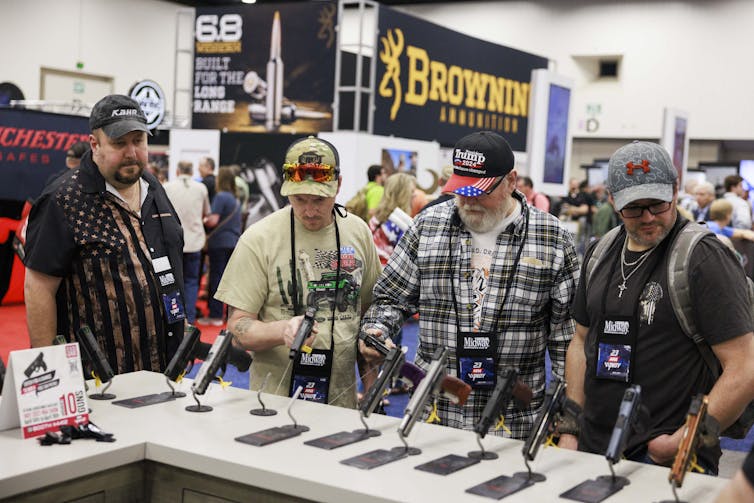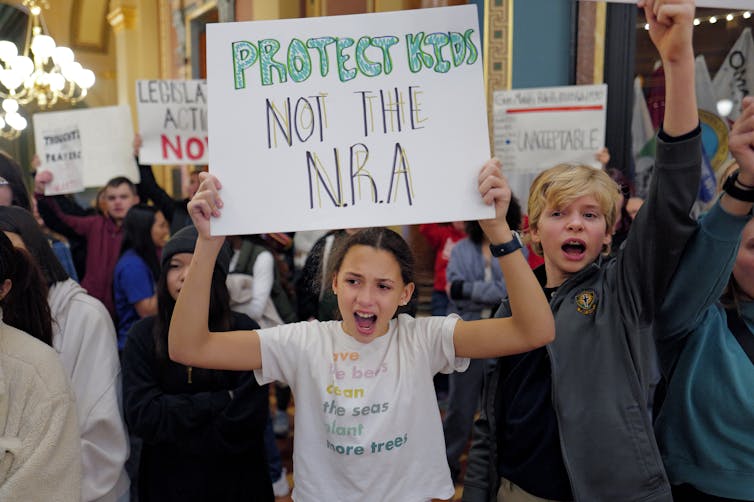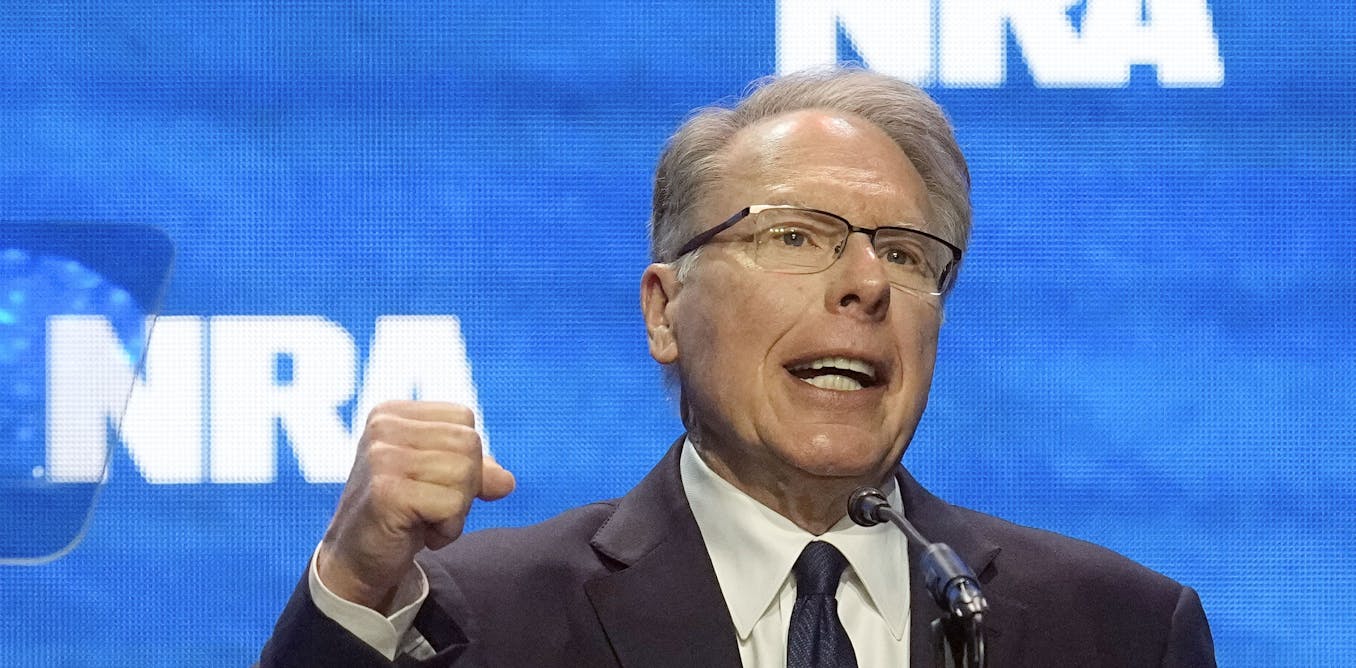Wayne LaPierre will resign from the National Rifle Association at the end of January 2024. During most of the 33 years he spent at its helm as its executive vice president, the gun group’s membership, revenue and clout grew sharply.
I am a historian of firearms politics and have researched the NRA’s long history. LaPierre’s legacy as leader includes an increasingly polarized political debate around the utility of guns and how easy it should be for Americans to buy them.
LaPierre, 74, cited “health reasons” as his rationale for resigning. The group announced his impending departure shortly before the NRA’s civil fraud trial began in New York City.
A few days later, the NRA clarified that he had chronic Lyme disease, and a filing from his doctor stated that he was experiencing “cognitive decline with difficulty performing daily tasks.”
From defeat to victory
Wayne LaPierre became the NRA’s executive vice president, its most powerful official, in 1991. Previously, he’d led the NRA’s lobbying arm, the Institute for Legislative Action.
He joined the NRA as a state lobbyist after working as a legislative aide to Virginia state Delegate Alfred Victor “Vic” Thomas, a conservative Democrat. Often described as bookish and quiet, LaPierre brought to the NRA his considerable skills as a political strategist.
But his first few years at the helm coincided with some significant legislative defeats.
In 1993, then-President Bill Clinton signed into law the Brady Handgun Violence Prevention Act, which established a system of background checks for people who buy guns from federally licensed dealers. The following year, Clinton signed the assault weapons ban into law.
That measure instituted a 10-year ban on the manufacturing of a small number of specific “military-style assault weapons,” such as the Colt AR-15, and high-capacity ammunition magazines. The law did not, however, ban guns that were already on the market or in private hands prior to its enactment.
Partly because of the NRA’s relentless opposition, Congress failed to renew that ban a decade later.
Over the course of his leadership, LaPierre cemented the NRA’s relationship with the Republican Party and made unwavering commitment to gun rights a politically viable, if volatile, strategy.
He also developed a pugnacious public persona, memorably calling federal agents “jack-booted government thugs” in a 1995 fundraising letter.

Jeremy Hogan/SOPA Images/LightRocket via Getty Images
Fighting gun control
During LaPierre’s reign, the NRA’s messaging celebrated armed individualism. He advocated for loosening gun regulations and denounced what he believed were partisan plots to confiscate guns from “law-abiding citizens.”
The NRA’s pitches to its members under LaPierre’s leadership, and the advertisements on the pages of its flagship publication, American Rifleman, reflected a change in tone from the NRA’s earlier culture. Though it occasionally celebrated and supported hunting or shooting sports, it increasingly emphasized the importance of firearms for self-defense.
At the same time, LaPierre’s NRA engaged in a concerted effort to change state laws regarding the concealed carrying of handguns.
Today, Idaho, Florida and 25 other states allow people to carry firearms without a permit: Nearly any adult can legally carry a concealed handgun without undergoing training or applying for a license.
With LaPierre at the helm of the NRA, congressional action toward gun control ground to a near halt. For lawmakers on both sides of the aisle, but especially for the NRA’s Republican allies, it became a political third rail, much like attempting to cut Social Security spending.
LaPierre also led the NRA through a sea change in the prevailing legal interpretation of the Second Amendment as its long effort to enshrine gun ownership as a constitutional right came to fruition.
This work began in the late 1970s – prior to LaPierre’s tenure at the top of the organization. But two landmark Supreme Court rulings, District of Columbia v. Heller in 2008 and New York State Rifle & Pistol Association v. Bruen in 2022, held that the Second Amendment guaranteed the civilian right to own guns and be armed outside the home.
Those rulings have forced states to reassess gun regulations already on their books.
Losing members, waning influence
An explosive 2019 report by The Trace in partnership with The New Yorker brought alleged misuse of the group’s funds to the attention of New York Attorney General Letitia James.
James has accused LaPierre of using the NRA as his “personal piggy bank.” He’s being sued, along with three other current and former NRA employees and the gun group itself, although one individual plaintiff already has reached a US$100,000 settlement. All told, they allegedly misused $64 million of the funds in the NRA’s coffers.
When he took the stand in the trial on Jan. 26, LaPierre confirmed that hundreds of thousands of dollars spent for his own private jet travel and for trips by his relatives were paid for by the NRA. He also acknowledged multiple jaunts on a luxury yacht with one of the group’s vendors.
LaPierre retained the support of most of the NRA’s 76-member board in the early period following the first reports of misuse of its funds, but the costs of the trial and these travails for the association are growing beyond dollars and cents.
The NRA is reportedly hemorrhaging members, a key source of its operating revenue and the heart of its political power.
According to a report by Stephen Gutowski in The Reload, the NRA had lost over 1 million members – out of around 5 million – since the allegations of corruption inside the leadership ranks came to light. That drop occurred even as more than 5 million additional Americans became first-time gun owners and gun sales hit record numbers in 2020 and 2021.
Tumbling revenue has also led to staff and program cuts, including hunter and shooter safety training programs that serve as important recruiting opportunities for gun owners who do not belong to the NRA. For the moment, it’s still the largest gun advocacy organization, though the spending gap between gun rights and gun control groups continues to narrow.

Scott Olson/Getty Images
No permanent replacement yet
The NRA’s courtroom strategy appears to be an attempt to distance itself from LaPierre. During opening arguments, NRA counsel Sarah Rogers acknowledged that Wayne LaPierre “was not always a meticulous corporate executive.”
The NRA’s attorneys are arguing that LaPierre’s resignation is one of many steps the association has taken to tidy up its house.
And yet his influence will remain in the short run, as longtime confidant Andrew Arulanandam will step into his shoes on an interim basis.
The NRA’s board will decide on a permanent replacement in May, when the group holds its annual meeting in Dallas.

